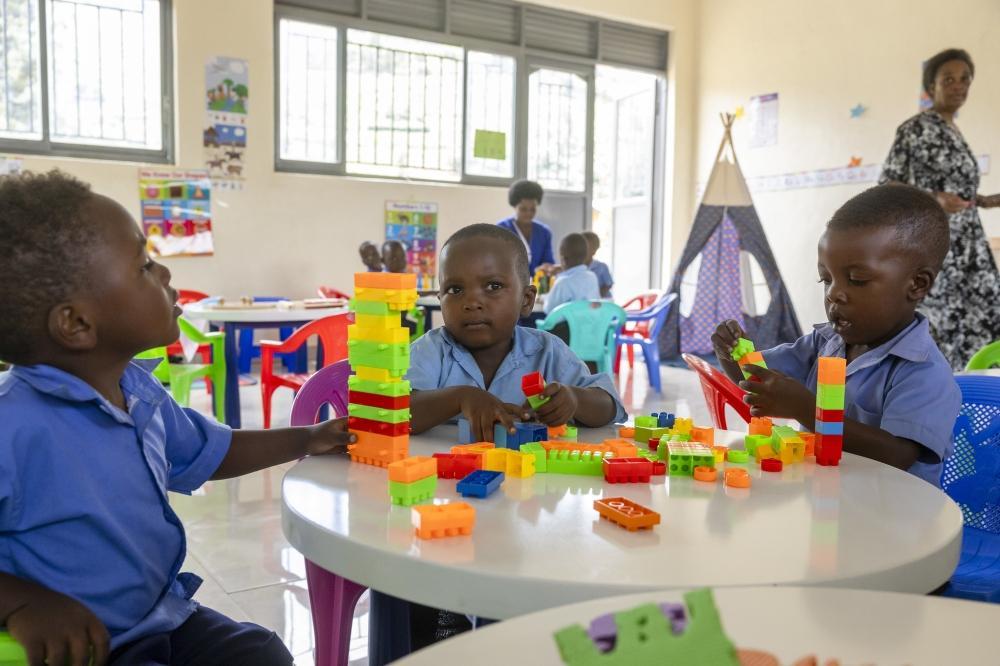Africa-Press – Rwanda. As part of a broader move of education reforms, the government revised school hours for lower primary learners, specifically P1 to P3, reducing their study load from 40 periods per week to 25. This translates to five lessons per day, with each period lasting 40 minutes.
Under the new schedule, pupils will now attend classes from 8:00 a.m. to 11:30 a.m., and from 1:10 p.m. to 4:50 p.m.
Previously, school hours stretched from 8:40 a.m. to 12:20 p.m., and then resumed at 1:30 p.m. and ran until 5:00 p.m.
What informed the decision?
According to Rwanda Education Board (REB), the decision was grounded in research and an evaluation of the Competence-Based Curriculum (CBC). This curriculum review is part of a standard five-to-eight-year cycle recommended globally to ensure that content remains relevant to learners’ needs and the evolving world.
“Our findings revealed that in many schools, the existing curriculum was too extensive for the time available,” said Flora Mutezigaju, the Deputy Director General of REB. According to her, some teachers were under pressure to cover a large syllabus, and learners were overwhelmed by the volume of content, some of which was linguistically or cognitively way above their level.
The situation was especially challenging for lower primary learners, many of whom are still building foundational skills in reading, writing, and comprehension. Studies showed that expecting young children to focus for eight periods a day was unrealistic, especially in schools with double shifts.
“We benchmarked with other countries and aligned our strategy with international guidance, including UNESCO recommendations,” Mutezigaju added.
“These show that for children aged six to nine, three to four hours of learning per day are sufficient for effective development. That’s what we’re aiming for with this change.”
‘We expect children to retain more of what they learn’
Anatholie Uzayisenga, a lower primary school teacher at Centre Scolaire Bisate in Musanze District, welcomed the new timetable, saying it reflects the thinking capacity of young learners.
“Previously, classes ran from 8:40 a.m. until 5:00 p.m., which was exhausting for teachers and pupils. Now, with fewer lessons and a more focused curriculum, we expect children to retain more of what they learn,” Uzayisenga said.
She emphasized that the change would also give children more time to rest and recharge during lunch breaks, improving their ability to concentrate in the afternoon.
“The [previous] curriculum was too solid, and we were supposed to rush through topics. With the revised schedule, we can teach more effectively, at a pace that matches their age and developmental stage,” she added.
Olivier Umuhire, the Head Teacher at GS Ngamba in Kamonyi District, said: “For schools like ours in rural areas, the shift is not entirely new. We’ve already been implementing flexible schedules. But standardizing this across the board is a good move, especially now that REB is revising textbooks to suit learners’ levels.”
Umuhire noted that this is a good move as the changes are expected to be accompanied by the development of age-appropriate learning materials, with simplified language and content that is more relevant. “However, it is still early for us to predict the actual outcome. But we also expect this move will support teachers’ well-being, reduce classroom fatigue, and improve learning outcomes.”
He noted that crowding remains a concern in many schools, but the double-shift approach offers a viable solution, especially when paired with the school feeding programme.
“While a single shift is ideal for deeper learning, double shifts ensure that every child gets time in class, even if classroom space is limited.”
Consolee Murekatete, a mother of two from Gasabo District, said she was open to the change, praising the government’s efforts to align content with children’s intellectual abilities.
“These are small adjustments, and I believe we’ll get used to them quickly,” Murekatete said. “Of course, consistency is also important. Changes to school hours should not happen too frequently, especially for younger children, who need stability in their routines.”
Murekatete emphasized that the long-term goal of improving education quality was what truly mattered.
“As long as these reforms are made with the children’s best interest in mind, we as parents are ready to adapt.”
For More News And Analysis About Rwanda Follow Africa-Press






